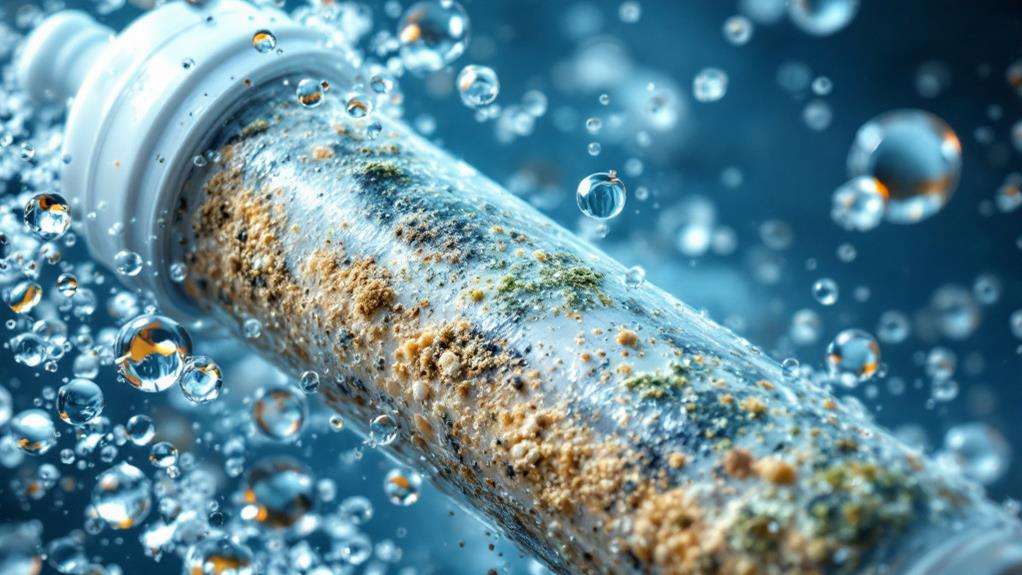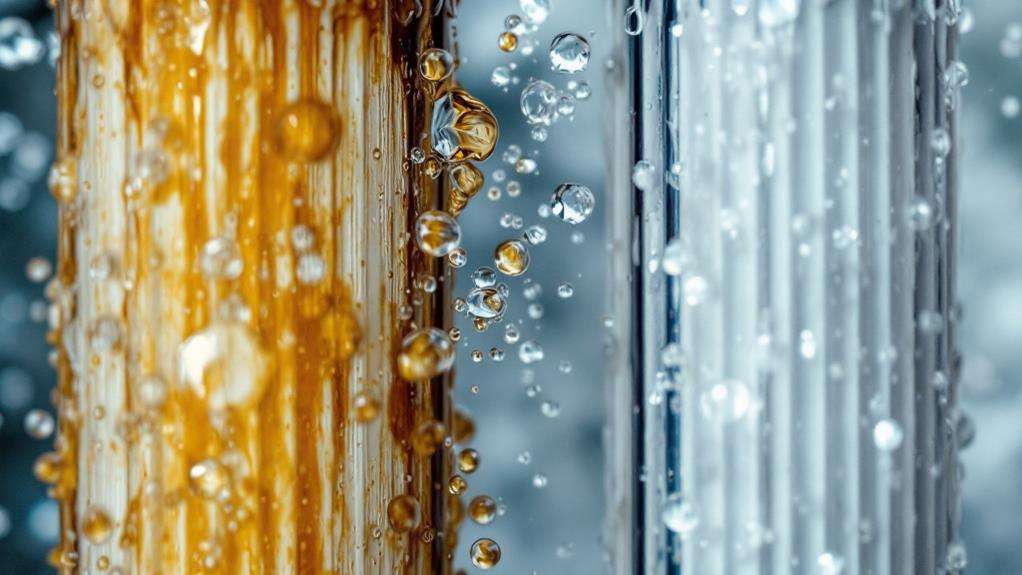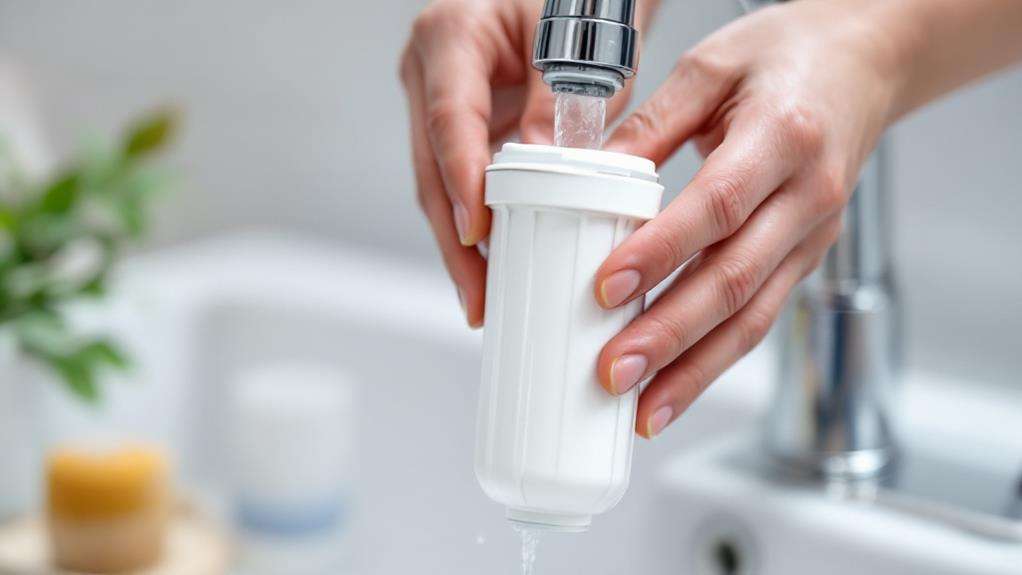How Long Do Water Filters Last? Signs It’s Time for a Replacement
Water filter lifespans vary depending on the type and usage. Pitcher filters typically last 2-4 months, while under-sink filters can function for 6-12 months. Reverse osmosis filters need replacement every 3-4 months, and whole-house filters have components requiring changes from 2-3 months to annually. Watch for signs it's time to replace your filter: changes in water taste or odor, decreased flow rate, visible sediment, or unusual color. Follow manufacturer guidelines and monitor water quality to guarantee satisfactory performance. Factors like water consumption, contaminant levels, and hardness affect filter longevity. Understanding these elements can help you maintain clean, safe drinking water.
Types of Water Filters
Water filters come in various forms, each designed for specific uses and locations in your home. The most common types include pitcher filters, faucet-mounted filters, reverse osmosis systems, whole-house filters, and under-sink filters. These water filtration systems use different technologies, but many incorporate carbon filters to remove contaminants and improve taste.
Pitcher filters are popular for their convenience and affordability, typically lasting 2-4 months. Faucet-mounted filters offer similar longevity, while reverse osmosis filters can last 3-4 months. Whole-house filters may require more frequent component replacements, ranging from every 2-3 months to annually, depending on the specific system. Under-sink filters generally have the longest lifespan, needing replacement every 6-12 months.
It's essential to replace your water filters according to the manufacturer's recommendations. Factors like water quality, mineral content, and frequency of use can affect filter performance and lifespan. High mineral content and frequent use can strain filters, reducing their effectiveness over time. To extend your filter's life, consider using a water softener, especially if you have hard water. This can help prevent mineral buildup and maintain your filter's efficiency for longer.
Average Filter Lifespans
While filter lifespans can vary widely, understanding the average duration for each type can help you plan for replacements and maintain water quality. Pitcher filters typically last 2-4 months, while under-sink filters can function effectively for 6-12 months. Reverse osmosis filters generally need replacement every 3-4 months. Whole-house filters are more complex, with some components requiring replacement every 2-3 months, while others may last up to a year.
Several factors influence a filter's lifespan:
- Water quality and contaminant levels
- Usage volume
- Filter quality and materials
Higher-quality filters often last longer than cheaper alternatives, potentially offsetting their initial cost. Larger, more complex systems like whole-house filters typically have lengthier lifespans compared to smaller, simpler options.
To ensure ideal performance, it's crucial to Replace your water filters according to the manufacturer's recommendations. However, you may need to replace them more frequently if you notice a decrease in water quality or flow rate. Keep in mind that filter replacement schedules can vary based on your specific water conditions and usage patterns. Regularly monitoring your water filter's performance will help you maintain clean, safe drinking water in your home.
Factors Affecting Filter Longevity

Although water filter lifespans are often advertised as fixed durations, several factors can considerably impact how long your filter actually lasts. The volume of water you consume plays a significant role; heavily used filters may need replacement more frequently than those in low-usage environments. Water quality is another vital factor. If your water contains high levels of sediment, contaminants, or total dissolved solids (TDS), your filter will have to work harder and may clog sooner.
Water hardness and mineral content can lead to scale buildup, reducing your filter's effectiveness and lifespan. However, using water softeners or pre-treatment systems can help extend your filter's life by removing minerals before they reach the primary filtration media. Environmental conditions, such as temperature, also affect filter performance. Cooler environments generally allow filters to function more efficiently and last longer than warmer ones.
Carbon filters, commonly used in many water filtration systems, are particularly susceptible to these factors. To guarantee ideal performance and durability of your water filters, consider your specific water conditions and usage patterns when determining replacement schedules.
Signs of Filter Degradation
Recognizing when your water filter needs replacement is key to maintaining clean, safe drinking water. As your filter media degrades over time, it becomes less effective at removing harmful contaminants from your water supply. Pay attention to these signs that indicate it's time to replace your filter:
- Changes in water taste or odor
- Decreased water flow rate
- Visible sediment or particles in filtered water
If you notice your filtered water has an unusual taste or smell, it's a clear indication that your filter is no longer performing adequately. Similarly, a significant reduction in water flow suggests that the filter media may be clogged or worn out. Keep an eye on the color and clarity of your filtered water; any visible particles or discoloration signal that contaminants are passing through.
Don't wait for these signs to become severe before taking action. Most manufacturers provide guidelines on when to replace filters, but your water quality and usage patterns may necessitate more frequent changes. By staying vigilant and replacing your filter at the appropriate time, you'll guarantee your drinking water remains safe and satisfying.
Importance of Timely Replacement

Timely filter replacement is the cornerstone of maintaining a healthy and efficient water filtration system. When you Replace Your Water filter regularly, you guarantee continued water quality and safety, prevent bacterial growth, and maintain ideal system performance. The Lifespan of Your Water filter typically ranges from 6 to 12 months, depending on usage and water quality.
Ignoring filter replacement can lead to reduced efficiency, decreased water pressure, and noticeable changes in taste or odor. You might also see visible debris in your water or experience an increased chlorine smell. These signs indicate that your filter's activated carbon has become saturated, reducing its effective surface area and ability to trap contaminants.
Prompt replacement at the first sign of filter degradation is essential. By doing so, you'll avoid costly repairs, extend the life of downstream components, and prevent potential health risks from contaminants and microbial growth. Remember, an inefficient filtration system can pose serious health hazards. Don't wait until you notice discoloration or reduced water flow to take action. Regular maintenance guarantees your water remains clean, safe, and pleasant to drink.
Extending Filter Life
While regular replacement is key, you can take steps to extend your water filter's life and get the most out of each cartridge. The lifespan of your water filter depends on various factors, including usage and water quality. To maximize its effectiveness, consider implementing a consistent replacement schedule based on these factors.
You can prolong the life of your water filter by:
- Using water softeners to reduce mineral buildup
- Turning off the tap when not in use
- Prioritizing filtered water for necessary tasks only
Mineral content plays a significant role in how long do water filters last. By using softeners, you'll reduce the strain on your filtration system, helping it perform better for longer. Additionally, proper installation of faucet-mounted filters is essential to prevent contaminated water from mixing with clean water.
Don't forget to clean and sanitize your filter regularly according to the manufacturer's instructions. This simple step can prevent premature clogging and maintain optimal performance. By following these practices, you'll not only extend the life of your water filter but also maintain its efficiency in providing clean, safe drinking water for you and your family.
Replacement Process and Tips

The replacement process for water filters is straightforward, but it's crucial to follow the correct steps. Whether you're dealing with a reverse osmosis system or a simple tap water filter, proper replacement guarantees continued access to clean, safe drinking water.
Start by consulting your manufacturer's guidelines for the recommended replacement schedule, typically every 6-12 months. However, don't rely solely on time; monitor your water quality and look for signs of filter degradation. If you notice decreased water pressure, changes in taste or odor, discoloration, or debris in your filtered water, it's time for a replacement.
When replacing your filter, turn off the water supply and release any pressure in the system. Remove the old filter carefully, disposing of it properly. Clean the housing if necessary, then install the new filter, making sure it's correctly seated. Before resuming normal use, run water through the system to flush out any loose particles.
To extend your filter's lifespan, consider factors like water usage volume, contaminant levels, and water hardness. Using additional water treatment systems can also help reduce the burden on your primary filter. By following these tips and staying vigilant about your water quality, you'll maintain peak performance and guarantee the safety of your drinking water.
Water Quality Monitoring Methods
In order to maintain ideal water quality, it's indispensable to regularly monitor your filtration system's performance. One effective method is using a total dissolved solids (TDS) meter to measure the mineral content in your water. This simple tool can help you identify when your system needs servicing or when it's time to replace your filters.
To guarantee you're getting the best water possible, consider these monitoring practices:
- Check your TDS levels monthly, especially if you have well water or hard water
- Compare TDS readings before and after filtration to gauge filter effectiveness
- Use the TDS meter to detect when your system can no longer remove chlorine effectively
